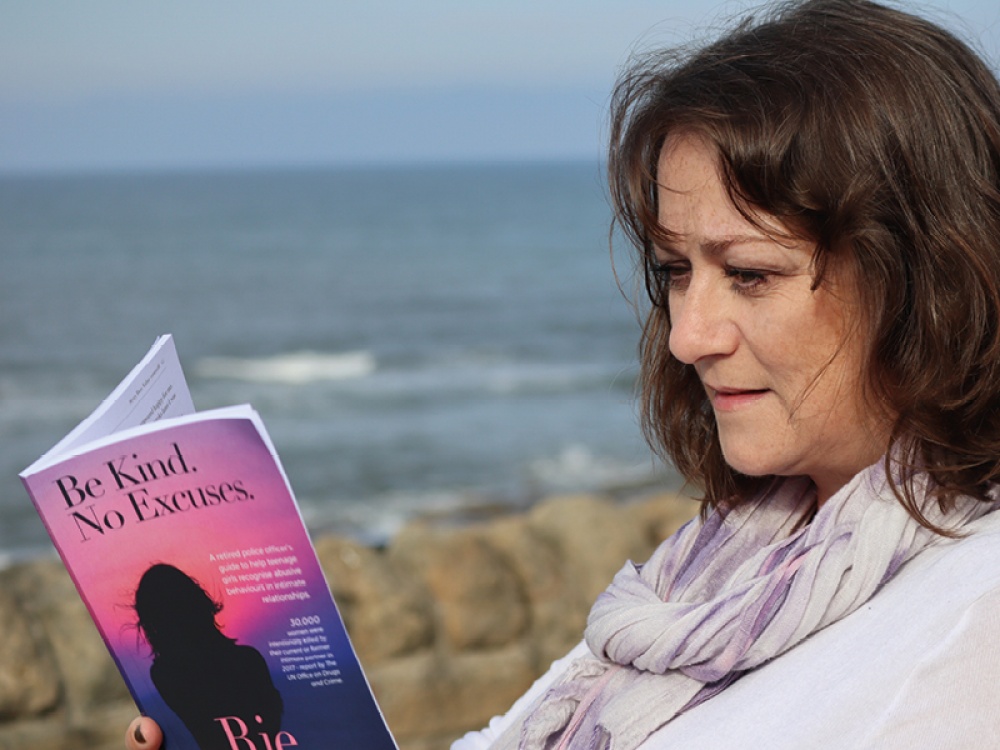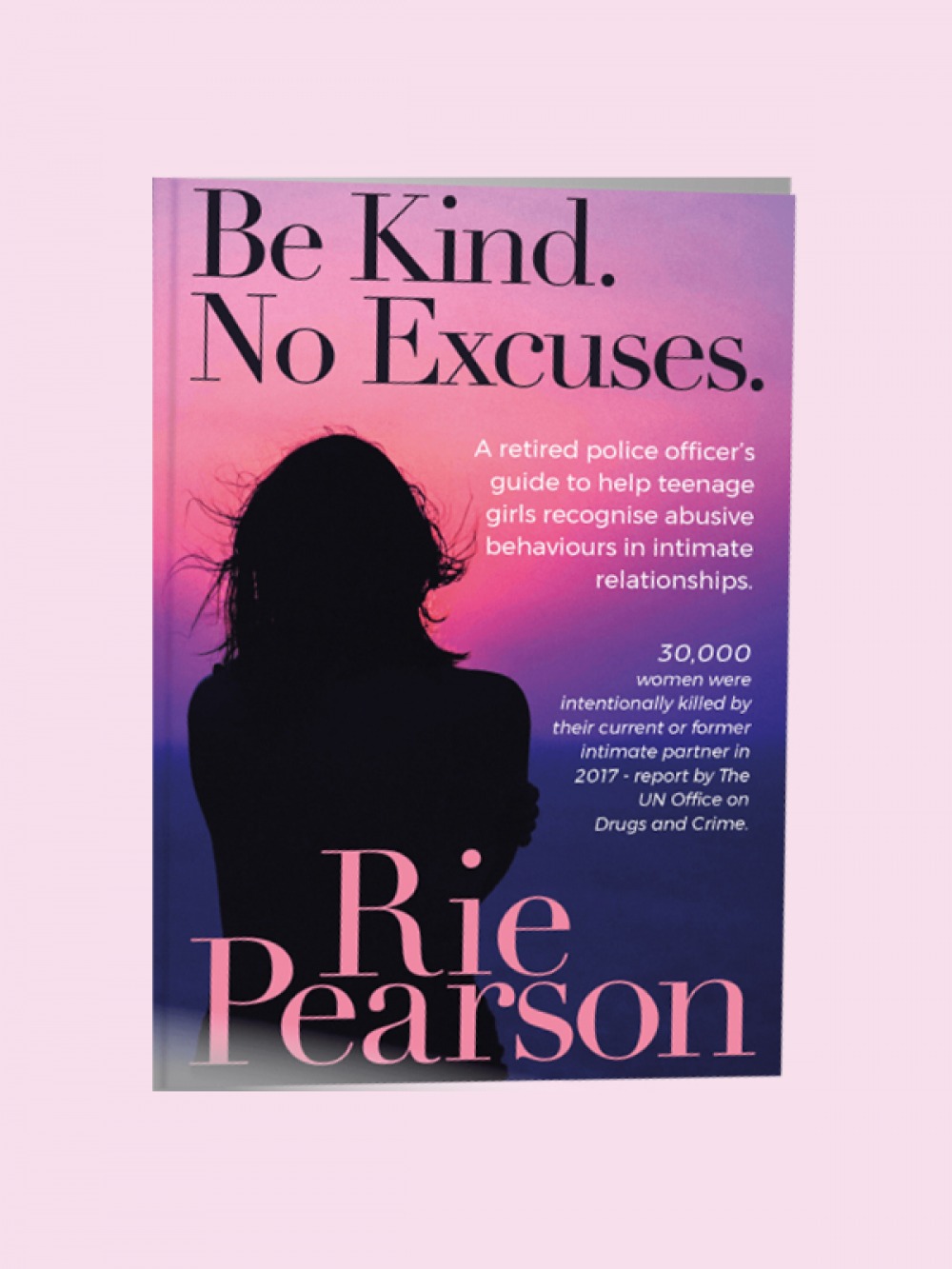How This Retired Police Officer Has Turned Her Desire to Protect Others into a Book

Rie Pearson spent 27 years of her life as a police officer: serving and protecting others. Retiring from the force, she has become a writer – and yet she is still serving others. Elizabeth Joseph find out more about her Second Act…
To understand more we need to go back to the beginning; back to the beginning of Rie’s career. Back to when she wasn’t even sure what career she might like to pursue, a time when she was open to any and all new experiences. Straight out of school, Rie got a job in the Civil Service, but felt sure that although such jobs could be jobs for life, that definitely wasn’t the life for her. Next, was a quality assurance job in a factory in Washington that made hearing aids. Then an advert in the Evening Chronicle caught her eye. ‘Me and my friend Janet would apply for jobs on a Thursday night, that looked quite interesting. I actually applied for a job at Northumbria Fine Foods, down on the Team Valley, just so I could have a look in the factory and work out how they got the chocolate on just the ends of those biscuits!’ laughs Rie.
A rather wonderful way to approach a job search in your early 20s! Although she was offered the job, she never did get to find out how they added the chocolate as she feels fate led her to her next job and indeed to her life’s work. She describes the serendipitous moment it all fell into place. ‘I was coming home on the bus to my flat in Bensham. It was a Friday afternoon on a bright sunny day. I was thinking “I’m sick of what I’m doing, I need something more than this”. I was 21. The bus stopped and across the road was The Bakehouse and a police car was parked outside. Out of the shop came these two female police officers holding packets of cakes and they were laughing, in fact they were laughing a lot. And I just looked at these two women and I thought, “I can do that for a living. I can definitely do that”. And the following Thursday Janet and I are looking at the Chronicle job section, and there’s an advert for Northumbria Police and I thought “that’s just meant to be.” So I applied.’
So at 22, after medicals, fitness tests, exams and interviews, Rie joined the police. She was one of only a few women based at Gateshead at the time, and things were very different back then. ‘I was issued with skirts to wear. And a handbag!’ Rie explains. ‘I remember chasing somebody one day, jumping over a fence and I got my skirt caught at the top of the fence. So I was basically upside down, hanging by my skirt, with my backside flashing at every passing car at rush hour on a Friday evening.’

Rie spent the first two years learning the basics, out on the beat. ‘We were face to face with the public, learning to talk to people, learning to deal with stuff and most of that time actually being on your own.’ In fact, Rie spent six years on the beat in Gateshead, but everything changed when she had her first child.
Interestingly this was not just a time when the few female police officers in the force wore skirts and carried handbags, it was also a time when female police officers who had kids would normally leave. ‘There were no female police officers with children that I can remember. Any female officer that was still there didn’t have kids. Female police officers had never been allowed to go on reduced hours before. Normally I would’ve had to leave.’
Yet Rie became one of the first officers to be offered reduced hours to fit in with family life, which she sees as a real sliding doors moment: had she been forced to leave the police force then all she went on to accomplish would never have happened. She would never have written her book that would go on to change lives, in fact to save lives. A book that helps young women to spot the early signs of domestic violence or ‘intimate partner abuse’ as Rie prefers to call it, feeling strongly that the word ‘domestic’ minimises the crime.
It all stemmed from with a move to Wickham Police Station. ‘At the time the police used to deal with the abuse by dealing with whatever the incident was,’ she says. ‘And then a female officer would ring the victim up the next day and say, “don’t worry, pet. It’ll all be fine”. Which was very patronising and also a lie. And it was always the pregnant police officer that got that job because you weren’t allowed outside!’
As Rie recalls, the pregnant police officer handling these phone calls was having a difficult pregnancy and had been off sick for some time. So Rie’s Chief Inspector insisted she take over. Her initial reaction was, she says, I am not, not, not doing that job. ‘I didn’t know any better at the time,’ explains Rie, ‘but it was seen as “just a domestic”. Common assault didn’t come with the power of arrest back then.’
For all she insisted it wasn’t for her, ultimately she was given no choice in the matter. The Chief Inspector’s main concern, it turns out, was the amount of resource being used up by the sheer number of victims who were calling all the time. Rie’s job, therefore, was to reduce the number of calls. ‘We weren’t looking at it from a safeguarding approach, in fact in the mid-90s, safeguarding wasn’t even a word. We looked at it from the perspective of “how can we stop these people phoning us?”’
She looked at the statistics to see who were the most common offenders. Looking at the situation as a whole, she concluded that put simply, it consisted of a victim, a perpetrator and a location. She figured that from a police perspective if she removed the perpetrator and left the victim in the location, usually with children, that would stop it happening. At least for the time the perpetrator was out of the house.
So she focused on the perpetrators, and quickly realised that 70 percent of them were committing other crimes in the area. She got the boss to buy her a whiteboard and positioned it next to the clock in the briefing room, as she knew that her colleagues’ eyes naturally strayed in that direction. She put the top 10 perpetrators of abuse up there with information about their comings and goings. And it worked. ‘The cops focused on those people and basically got them for other crimes, and that meant if we got them remanded in custody, even if it was just for a week, it took the pressure off the family – they had some respite.’
Having initially been less than keen to take on the job, Rie proceeded to put her heart and soul into it. ‘I’m a bit of a Jack Russell once I get my teeth into something,’ she confesses. ‘I was reading everything I could find. I was doing loads of research and it was a perfect time for me to be honest because the Safer Families project had just set up in Gateshead. It was the first holistic support service of its kind that dealt with the perpetrator, the victims and the children.’
Rie begged her Chief Inspector to be allowed to work on the perpetrator side of the project and she soon found herself working with men who had been told to either go on the Safer Families course, or face prison, or lose their children forever. ‘These guys were serious offenders. Some didn’t change but for others there were real light-bulb moments that changed their lives forever. It saved lives. It was a brilliant service.’
Word got around about the work Rie was doing and it wasn’t long before someone came down from headquarters to check her and her whiteboard out. Before she had time to think too deeply she had moved down to work in headquarters. ‘Domestic assault incidents hadn’t been dealt with as a Crime Department issue before,’ Rie explains. ‘But eventually they did put it in Crime and in 2004 set up Public Protection Units, and I ended up working on a project down in The Met where we developed a Risk Assessment tool. That was little old me, a police constable from Northumbria, down on a project with Chief Inspectors and Superintendents. I was just in the right place at the right time,’ she concludes, rather humbly in my opinion.
This little Jack Russell of a police officer from Northumbria went on to work with Professor Jill Radford, an academic expert in domestic violence from Teesside University, on Home Office research, and Professor Marianne Hester, a leading researcher of gender-based violence. As a result of such experiences and involvement in groundbreaking research, projects and policy, Rie Pearson is now, herself, an expert on domestic violence. As she says, she knows things that she almost wishes she didn’t, but they mean she can immediately see and hear and spot the signs of a domestic abuser.
The book had been in the back of her mind for at least 15 years before she left the police force. So when she did in fact retire she decided now was the time to write it. Rie’s book, however, takes a very different approach to the subject of domestic violence. As she points out there are already many great books out there but they always deal with after the event, after it’s happened.
Rie wanted to write something that stopped women from getting into those relationships in the first place, so they themselves don’t have to write a book after they have survived nearly being murdered by their abusive spouse.
‘Be Kind, No Excuses’ is about making sure the abuse doesn’t happen in the first place, and the structure of the book is a series of five true stories, which Rie then unpicks. ‘If people read a story, or they are told a story, they are more likely to remember it than if they are given statistics,’ she explains.
In the unpicking of the stories Rie shows where each abuser crosses a boundary – usually within 30 minutes of meeting. The book is written for teenage girls and it is written to help them to spot these red flags.
And of course Rie now finds herself busier than ever, running workshops and courses as her book creates more and more interest and a desire to ensure that teenage girls are safeguarded from this kind of intimate partner abuse. Once again Rie Pearson is working hard to serve others. Her Second Act a glorious continuation of her first.







